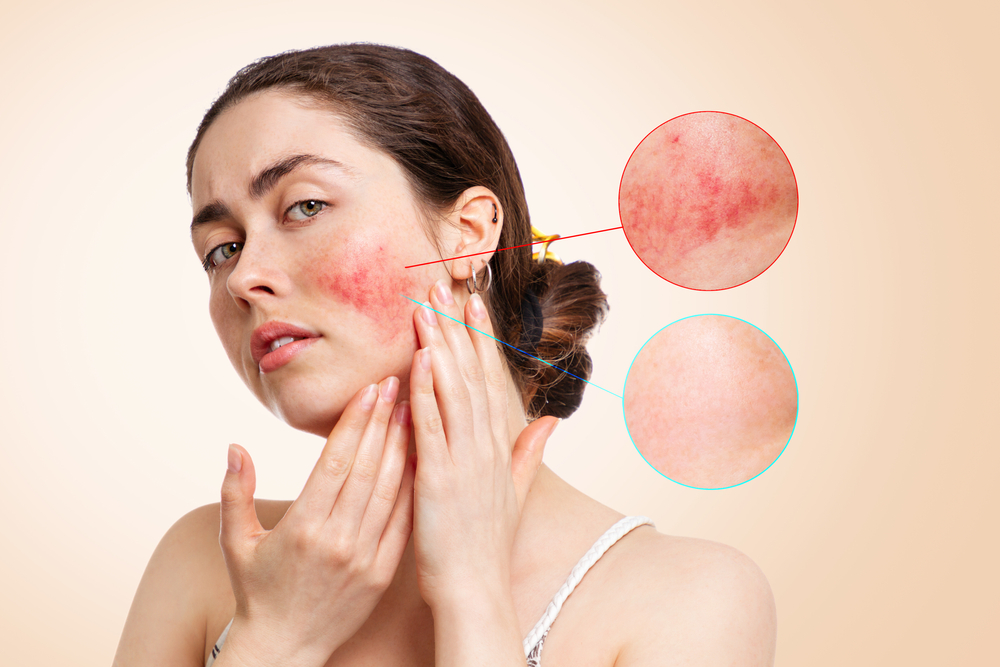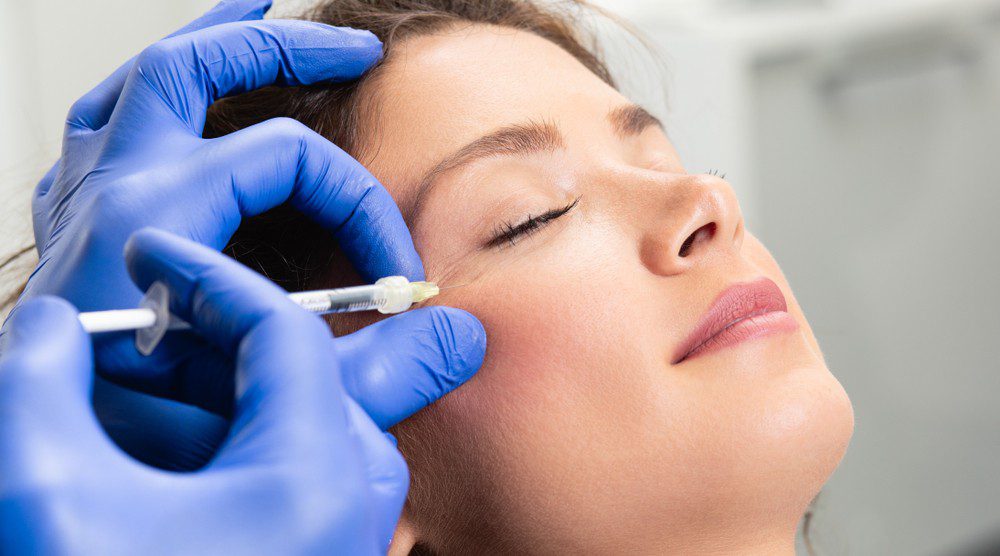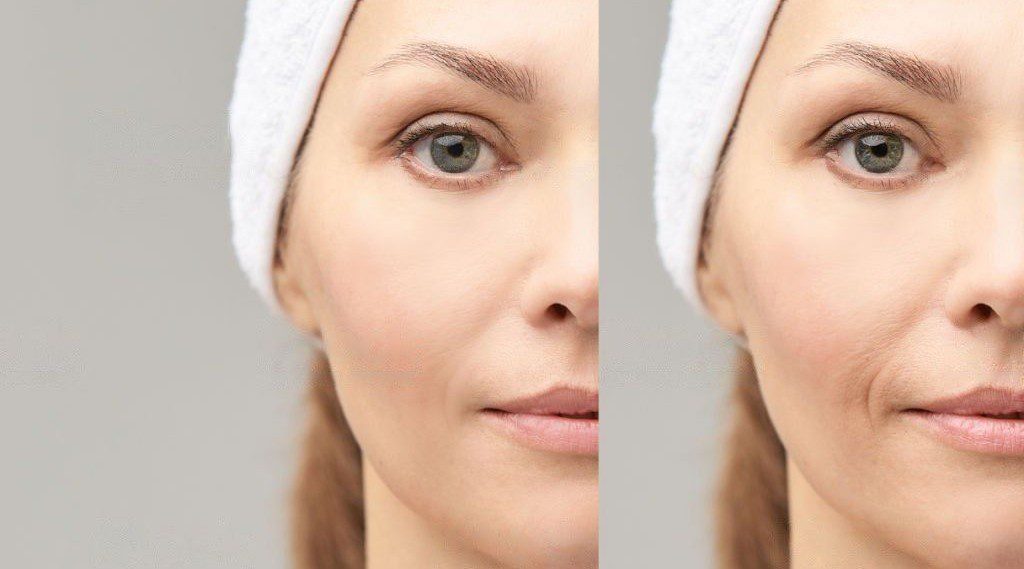Sensitive Skin - Symptoms, Causes, Treatments

What is Sensitive Skin?
A common condition characterized by heightened reactivity to various external factors, leading to discomfort, redness, irritation, and sometimes even visible skin changes. Individuals with sensitive skin often experience discomfort and irritation when exposed to triggers that may not affect those with typical skin types.
Sensitive Skin Symptoms
- Redness: Sensitive skin often appears red, especially when exposed to triggers like temperature changes, certain skincare products, or environmental factors.
- Irritation: The skin may become easily irritated, leading to discomfort, burning, or stinging sensations.
- Dryness: Sensitive skin is often prone to dryness, which can cause flakiness, rough texture, and a tight feeling.
- Itching: Itchiness is a common symptom, and people with sensitive skin may find themselves frequently scratching or rubbing their skin.
- Burning or Stinging: Some individuals with sensitive skin experience burning or stinging sensations, especially when they come into contact with certain products or environmental conditions.
- Tingling: Tingling sensations can occur, even in response to mild stimuli or gentle touch.
- Rashes: Sensitive skin may develop rashes, which can vary in appearance from small red bumps to raised, itchy areas.
- Blotchiness: The skin may appear uneven or blotchy, especially after exposure to triggers like temperature changes or stress.
- Flushing: Flushing, or sudden reddening of the skin, can occur in response to triggers like spicy foods, alcohol, or emotional stress, particularly in individuals with rosacea-prone skin.
- Allergic Reactions: In some cases, sensitive skin can lead to allergic reactions, such as hives (raised, itchy welts) or contact dermatitis (red, itchy rash at the site of contact with an allergen).
Sensitive Skin Causes
- Environmental Factors: Sensitivity can be exacerbated by extreme temperatures (hot or cold), wind, humidity, and pollution.
- Skincare Products: Many people with sensitive skin react to specific products, especially those containing fragrances, alcohol, harsh chemicals, or preservatives.
- Allergens: Allergens, such as pollen, pet dander, and dust mites, can trigger skin reactions in sensitive individuals.
- Cosmetics: Makeup and cosmetics with certain ingredients can irritate those with sensitive skin.
- Fabrics: Some fabrics, like wool or synthetic materials, can irritate sensitive skin, leading to itching or redness.
- Food: Certain foods, particularly spicy or acidic, may trigger skin reactions in some individuals, although this is less common.
- Stress: Emotional stress and anxiety can exacerbate skin sensitivity and lead to flare-ups of skin conditions like eczema or rosacea.
- Genetics: Some people are genetically predisposed to sensitive skin, which can run in families.
- It's important to note that sensitive skin is a subjective condition, and what triggers sensitivity can vary from person to person. Additionally, sensitive skin can be associated with specific skin conditions, such as:
- Rosacea: A chronic skin condition that causes redness, flushing, and visible blood vessels on the face.
- Eczema (Dermatitis): A condition that leads to dry, itchy, and inflamed skin.
- Contact Dermatitis: An allergic reaction or irritation caused by contact with specific substances or allergens.
Sensitive Skin Treatment Options
Treatment options for sensitive skin depend on the underlying cause and specific symptoms.
Here are some common treatment approaches for sensitive skin:
Gentle Skincare Routine:
- Use mild, fragrance-free, and hypoallergenic cleansers, moisturizers, and sunscreen.
- Avoid products with harsh chemicals, alcohol, and fragrances.
- Consider using products labeled for sensitive skin.
Moisturization:
- Keep the skin well-hydrated with a gentle, hypoallergenic moisturizer.
Sun Protection:
- Use sunscreen with a high SPF to protect sensitive skin from UV damage.
- Opt for physical (mineral) sunscreens with zinc oxide or titanium dioxide.
Avoid Triggers:
- Identify and avoid triggers that worsen skin sensitivity, such as extreme temperatures or specific skincare products.
Lifestyle Modifications:
- Maintain a healthy diet and stay hydrated.
- Manage stress through relaxation techniques like meditation, journaling, or yoga.
- Get adequate sleep and exercise regularly.
Prescription Medications:
- Dermatologists may prescribe topical or oral medications in cases of severe sensitivity or associated skin conditions like eczema or rosacea.
- These medications may include corticosteroids, immunomodulators, or antibiotics.
Topical Steroids:
Dermatologists may prescribe low-potency topical steroids for short-term relief of itching and inflammation.
Prescription Topicals:
Topical treatments like metronidazole or azelaic acid may be prescribed for certain skin conditions like rosacea.
Phototherapy:
Dermatologists may recommend phototherapy (light therapy) to manage symptoms in specific skin conditions, such as psoriasis.
Counseling and Stress Management:
Consider therapy or stress management techniques if stress significantly contributes to skin sensitivity.
When to Seek Professional Help for Sensitive Skin?
If your sensitivity is severe or persistent, consult a dermatologist for a professional evaluation and personalized treatment plan.
Remember that managing sensitive skin may require trial and error to find the right products that work best for you, as they vary significantly from person to person.
Preventative Measures for Skin Sensitivity
- Patch-test new skincare products.
- Use gentle, fragrance-free, and hypoallergenic products.
- Limit the number of skincare products.
- Apply sunscreen with high SPF.
- Avoid hot water during baths/showers.
- Choose soft, natural fabrics for clothing.
- Use hypoallergenic laundry detergents.
- Maintain a balanced diet and hydration.
- Manage stress through relaxation techniques.
- Protect skin from harsh environmental conditions.
- Consult a dermatologist for severe or persistent sensitivity.
Natural Remedies and Home Care for Skin Sensitivity
Natural remedies and home care can help manage skin sensitivity, often involving gentle, soothing, and hypoallergenic ingredients. However, it's essential to remember that what works for one person may not work for another, so it's crucial to patch-test any new remedies and monitor your skin's response.
Here are some natural treatments and home care tips for skin sensitivity:
- Oatmeal Baths: Colloidal oatmeal can be soothing for sensitive and inflamed skin. Add finely ground oatmeal to your bathwater or create a paste by mixing it with water and applying it to affected areas.
- Cucumber Slices: Cucumber has a cooling effect on the skin. Place thin cucumber slices on your eyes or any areas of redness for a few minutes to reduce irritation.
- Coconut Oil: Coconut oil can provide moisture and act as a natural barrier for the skin. Apply a small amount of extra-virgin coconut oil to dry or irritated areas.
- Honey: Honey is known for its antibacterial and moisturizing properties. Apply raw, organic honey to affected areas for 15-20 minutes, then rinse off gently with lukewarm water.
- Cotton Clothing: Wear loose-fitting clothing made of natural, breathable fibers like cotton to reduce friction and irritation.
- Gentle Cleansing: Use a mild, fragrance-free, and soap-free cleanser to wash your face and body. Avoid scrubbing vigorously, and pat your skin dry with a soft towel.
- Cold Compress: Applying a cold compress (a clean cloth soaked in cold water) to irritated areas for a few minutes can help reduce redness and discomfort.
- Aloe Vera: Known for its calming and anti-inflammatory effects, smooth a light coat of genuine aloe gel over affected regions to lessen irritation and redness.
- Avoid Hot Baths and Showers: Warm water can remove essential oils from your skin, contributing to dry and sensitive conditions.
- Hydration: Consuming adequate water nourishes your skin internally, preserving the skin's protective barrier.
Sensitive Skin FAQs
What are the four types of sensitive skin?
Sensitive Skin with Redness (Rosacea-Prone Skin), Sensitive Skin with Dryness (Xerosis-Prone Skin), Sensitive Skin with Burning or Stinging (Neurosensitive Skin), Allergic Contact Dermatitis.
What causes sudden skin sensitivity?
Sudden skin sensitivity, where the skin becomes more reactive and prone to irritation or discomfort, can occur for various reasons. Identifying the specific cause can sometimes be challenging, but here are some common factors that can lead to sudden skin sensitivity:
- Environmental changes
- Harsh skincare products
- Stress, Medications
- Dietary factors
- Allergic reactions
- Sunburn
- Hormonal changes
Can stress cause skin sensitivity?
Yes, stress can contribute to and exacerbate skin sensitivity. The relationship between stress and skin conditions is complex. While stress alone may not directly cause skin sensitivity, it can worsen existing skin conditions and trigger flare-ups.
What is the difference between skin sensitivity and allergies?
Skin sensitivity and allergies are related but distinct concepts regarding how the skin reacts to various substances or environmental factors. In summary, skin sensitivity refers to a general heightened reactivity of the skin, which can occur without an immune system response and may involve various triggers.
On the other hand, allergies affect a specific immune system reaction to a particular allergen and result in characteristic allergic symptoms. It's essential to differentiate between the two, as the management and treatment approaches for skin sensitivity and allergies can vary significantly.
How do you diagnose sensitive skin?
Diagnosing sensitive skin typically involves a process of exclusion and assessment by a specialist, often a dermatologist. No specific medical test or laboratory analysis can definitively diagnose sensitive skin. Instead, healthcare professionals rely on a combination of medical history, physical examination, and discussions about your skin's reactions and triggers.
Most Popular:
-

Sciton HALO vs Sciton BBL
Read More »September 20, 2022 -

What is profhilo, and how is it different from fillers?
Read More »September 20, 2022 -

Body contour solutions from SKIN111
Read More »September 20, 2022 -

Does IV GLUTATHIONE therapy work
Read More »September 20, 2022 -

How can an IV drip help you boost your energy
Read More »September 20, 2022